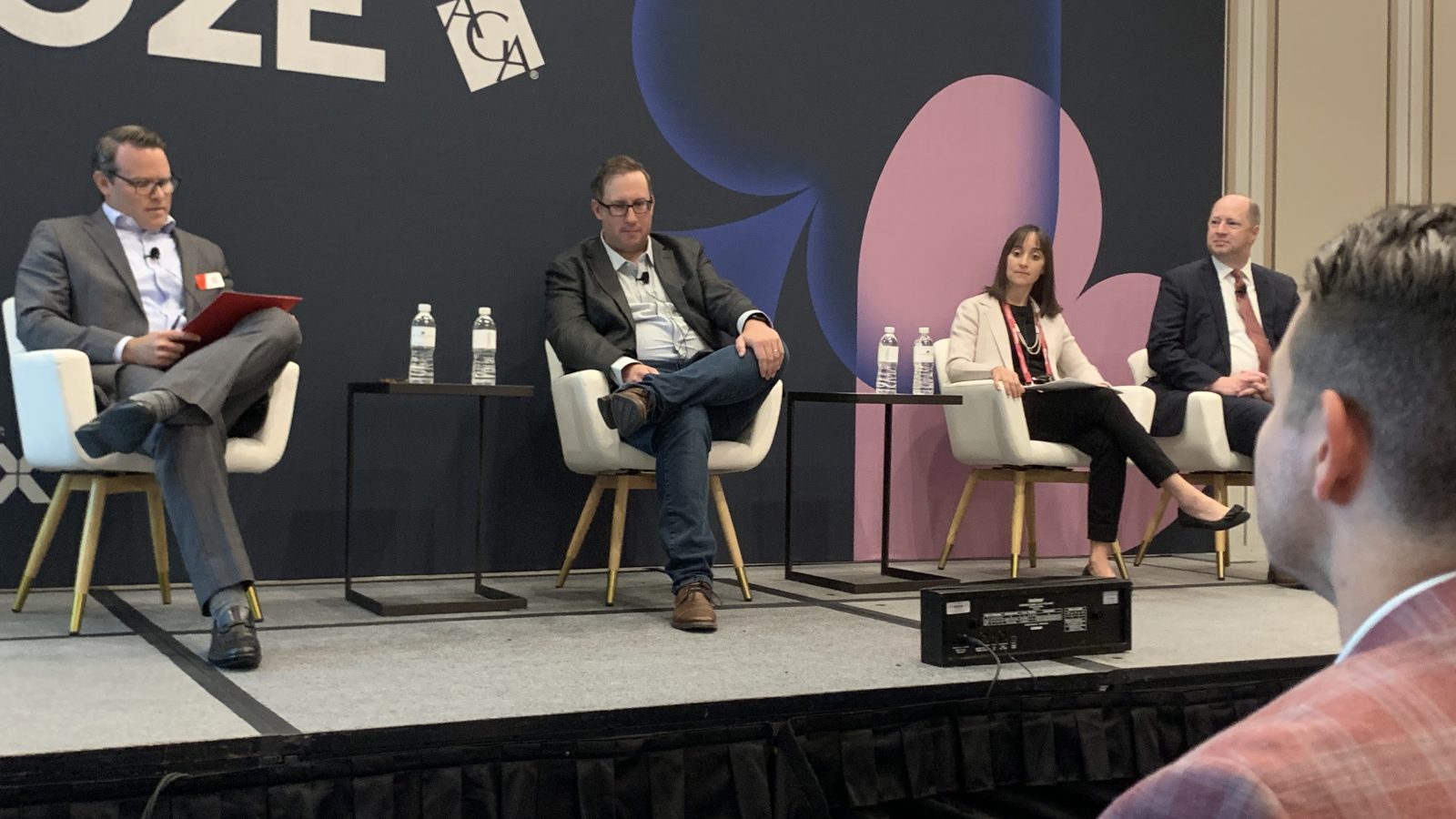The legal status of sports event contracts will ultimately be decided by the Supreme Court, but likely not until 2027 or 2028, according to speakers on arguably the most hotly anticipated panel of G2E 2025.
In a standing-room-only panel Wednesday in Las Vegas, consultant and journalist Dustin Gouker of The Closing Line, Covington & Burling LLP Partner Kevin King, and Arizona Department of Gaming Director Jackie Johnson discussed the rise and future of prediction markets. (Gouker is an occasional contributor to InGame.)
King said there were three “P”s that were important to the lawsuits surrounding the status of prediction markets: preemption, procedure, and patience.
Preemption, the question of when a federal law supersedes a state law, has been at the center of Kalshi’s lawsuits against the states of Maryland, New Jersey, Nevada, Massachusetts, and now — after a lawsuit filed Tuesday — Ohio.
Kalshi argues that the federal Commodity Exchange Act (CEA) preempts state gambling laws, and states cannot enforce these laws against the business. States argue that their gaming laws are not preempted, as the CEA was only ever intended to cover regulation of commodities and financial products.
“When it comes to state regulatory authority, courts apply a strong presumption against preemption,” King said. “They presume that Congress does not displace longstanding state authority, like the kinds of operations that state regulators have been engaged in for decades or even centuries, unless Congress speaks clearly on the issue.
“And so if you wanted to break down the main legal question in these cases, if you had to get it down to a single sentence, it would be to say, ‘Has Congress clearly blocked states and tribes from regulating these sports-based contracts?’ It will come as no surprise that the prediction market operators have argued that the answer to that question is yes. A number of states, the AGA [American Gaming Association], and others have argued that the answer is no.”
Still early stages
Regarding procedure, King pointed out that decisions in some of those lawsuits — Kalshi was granted preliminary injunctions in Nevada and New Jersey, but was denied one in Maryland — were still just a very early part of litigation proceedings.
The injunctions, he pointed out, are granted and denied based in part on likelihood of winning the case on the merits, but also in part on the question of whether one party would be irreparably harmed by the court granting or failing to grant an injunction.
“If you hear about court rulings saying one side or the other one, right now those rulings are preliminary,” he said. “I’d say we’re somewhere in the first quarter for most of these cases.”
Because final rulings from even the district courts are still a long way away, King stressed the idea of patience. In his view — echoed by Gouker — the case could eventually come before the Supreme Court. However, for that to happen, the court would usually first want to see two of the circuit courts disagree.
Currently, the U.S. Court of Appeals for the Third Circuit is hearing an appeal of the decision to grant Kalshi an injunction in New Jersey, while the Fourth Circuit is hearing an appeal of the decision not to grant one in Maryland. Crypto.com, which was denied an injunction in Nevada in a case concerning its own sports event contracts, has also said it will appeal that decision in the Ninth Circuit.
But King said the Supreme Court may wait until it sees two circuit courts disagree on final rulings about the legality of the contracts, rather than injunctions, before it would hear the case.
“From my experience, the [Supreme] Court doesn’t like to get involved right away,” he said. “They want to see an entrenched split.
“We could get to that point next summer, if New Jersey, Maryland, and Nevada rule in different ways at the preliminary stage. But I view that as less likely. The Supreme Court doesn’t like to get involved at the preliminary stage if it doesn’t have to.
“But the other pathway is on the merits, when these cases actually reach a conclusion on who wins and loses and it goes to appeal. We’ve already seen a mixed bag and if we continue to see a mixed bag then it’s a question for the Supreme Court.”
King said it could be years before the case reaches the highest court in the U.S.
“I don’t think this is a question of if these issues reach the Supreme Court, I think it’s a question of when,” he said. “And if there was a prediction market on that question, the safe bet would be the summer of 2027 or 2028.”
Johnson agreed that the issue could take a long time to be settled.
“Litigation is going to take time and patience,” she said. “Some of us have more patience than others.”
Gouker also warned that some people in the industry were too complacent, believing that sports event contracts will go away due to a “common sense” view of them as illegal sports betting.
“People think we’re going to get to a world of common sense and prevail, and I don’t,” Gouker said. “I hope that’s the case, that we have common sense, whether it means it goes away, whether we have smart regulations, so that we actually have this in a way that works better.”
Courts, he said, may not see it the same way.
States need to be proactive
Until there is a final judicial ruling, Gouker said states need to be more proactive in finding ways to challenge sports event contract operators and make it harder for them to do business.
“Do something more proactive,” he said. “A cease-and-desist is proactive, but there’s more to be done.”
On Wednesday morning, Pennsylvania Gaming Control Board Executive Director Kevin O’Toole sent a letter to the state’s congressional representatives in the House and Senate calling sports betting via prediction markets a “significant threat” to regulated betting in the state. Gouker praised this move as a new way of encouraging policy makers to take action.
Johnson — whose state sent a cease-and-desist letter to Kalshi in May, and a letter to licensees warning them against getting involved in the sector last month — said that states, tribes, and regulated sportsbooks need to collaborate in their opposition to prediction markets.
“I think continued collaboration is essential — tribes and states working together,” she said.
“And I would also make the call to licensed operators. In Arizona, we have wagering and it’s pretty expansive, it includes exchange wagering.
“My call for the operators who have invested so much time into wagering and who have put in place responsible gaming, is to work with the regulator to uphold the regulated market.”
Kalshi raises ‘red flags’ with AZ regulator
Johnson said prediction market operators like Kalshi had raised “huge red flags” because they do not have all of the same responsible gambling and consumer protection rules that exist for a state-regulated sportsbook. They are also available to anyone over the age of 18, she noted, whereas the legal age to bet in Arizona is 21.
“We’ve talked in our office about it,” she said. “You can have 18-year-olds in high school, and they’re allowed to bet on Kalshi. They’re running wild essentially, without any real consumer protection.
“There’s a myriad of different protections in place in our state laws that we require of our wagering operators. For instance, licensing and suitability checks, anti-money laundering, technical standards, internal controls, auditing, integrity monitoring, consumer protection safeguards, advertising, dispute resolution.”
In Gouker’s view, sports event contracts were a particular concern because of the blending of betting as an entertainment product with investing.
“It’s a dangerous precedent of somebody trading sports on Robinhood,” he said. “I have my stocks here and right over there’s the moneyline for tonight’s baseball game, or football game, or whatever it is. That’s the market. It seems really crazy to me that that exists.”





